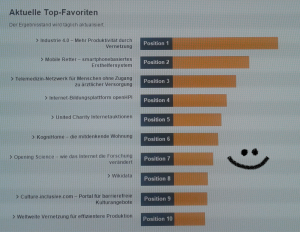Science for a sustainable and just world: a new framework for global science policy? #openscience
Hackmann and Boulton on challenges for science and how to reactThe case of Lingua/Glossa should make us think about Open Access (text in German only)
Letzte Woche trat das Editorial Board der linguistischen Fachzeitschrift Lingua geschlossen zurück. Die Gruppe um den Chefredakteur Johan Rooryck, Sprachwissenschaftler an der Universität Leiden, kündigte an, ein neues Journal unter dem Namen Glossa zu gründen. Rooryck begründet den Rücktritt des Editorial Board damit, dass das Verlagshaus Elsevier, bei dem Lingua erscheint, nicht auf deren Open-Access-Bedingungen eingehen will. Lingua existiert seit 1949 und ist auf Google-Scholar immerhin unter den wichtigsten drei sprachwissenschaftlichen Fachzeitschriftenzu finden.
Austria is going full Open Access by 2025
Good news: Representatives from the Austrian research organizations presented a plan for full open access by 2025.Impressions from the iKNOW Conference
A blogpost with a short summary of this year's iKNOW conference.Language of Protest
All six editors and all 31 editorial board members of Lingua, one of the top journals in linguistics, last week resigned to protest Elsevier's policies on pricing and its refusal to convert the journal to an open-access publication that would be free online.This might be the beginning of an interesting trend …
Sascha’s and Sönke’s text on plagiarism in Germany (in German)
Last week Sascha and Sönke wrote an article for the German Huffpo on the plagiarism in German Ph.D. theses. (The text is in German).What happens when you give the same data to 29 research teams?
Last year, we recruited 29 teams of researchers and asked them to answer the same research question with the same data set.
Jonas Kaiser and Benedikt Fecher on #academicblogs
In a substantial analysis of over 500 German-speaking science blogs, Jonas Kaiser and Benedikt Fecher look at what hyperlinks are used within prominent science blogs to investigate how scientists link to each other and outside sources. Using visualisation and mapping software, their results show how science blogs form new networks beyond traditional disciplines and interact with the wider general blogosphere.Sascha Friesike on Research in the Digital Age
In German onlyOpen Science in the Land of Ideas
We are very happy that our Open Science Project got the «Deutschland – Land der Ideen» award.
We made a short video to celebrate.
CERN helps europe develop an open science cloud
The EU will fund research into the development of a unified European open science cloud
Today is the last chance to vote for #openingscience @land_der_ideen
Please support our team with your vote @land_der_ideenNature editorial: Rise of the citizen scientist
Scientists and funders are right to encourage the shift from passive citizen science — number crunching — to more-active roles, including sample collection.Let's see about that.
Hard as he tried, Murray Gell-Mann could never make himself into a legend like Richard Feynman
Oldie but a goldie. Goerge Johnson on why one scientist becomes famous and another not.Helpful glossary for transdisciplinary research data management
Provided by Research Data Canada (RDC) in partnership with the international Consortia Advancing Standards in Research Administration Information (CASRAI)Prof, nobody is reading you
On average a journal article is read by 10 people. 82 per cent of articles published in humanities are not even cited once. Only 20 per cent of papers cited have actually been read. Is our system broke?Please vote for openingscience.org
Our openingscience.org-project is nominated for the Germany - Land of Ideas price. Please vote for us.Making data count
Kratz and Strasser on what could foster data sharing.Knowledge infrastructures in science: data, diversity, and digital libraries
Unfortunately hidden behind a paywall. Borgman et al.'s new article on the necessity for digital libraries to manage research data. From the abstract:This article addresses the role of digital libraries in knowledge infrastructures for science, presenting evidence from long-term studies of four research sites. Findings are based on interviews (n=208), ethnographic fieldwork, document analysis, and historical archival research about scientific data practices, conducted over the course of more than a decade.
Interview: Datasharing in Academia
Our Benedikt Fecher was interviewed by the Swiss Newspaper NZZ. The interview is in German.Open Access Strategy for Berlin
The Berlin Senat works on a Open Access strategy for its universities. By 2020 60% of all publications are planned to be under open access. The article is in German.‘My professor demands to be listed as an author on many of my papers’
This is kind of the key point in this piece: reputation matters hugely to scientists, but only with regards to the number of papers you publish (which is why people steal authorship) or (in the best case) how good the research is. However, we don’t care whether a scientist has a reputation for being honest or rigorous because it gets you nowhere in the current model of academia. And yet honesty and rigour is what science is all about.

